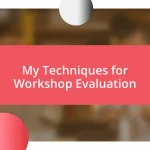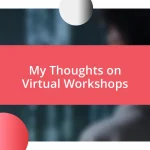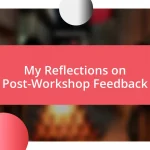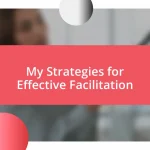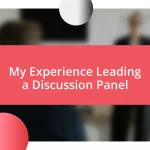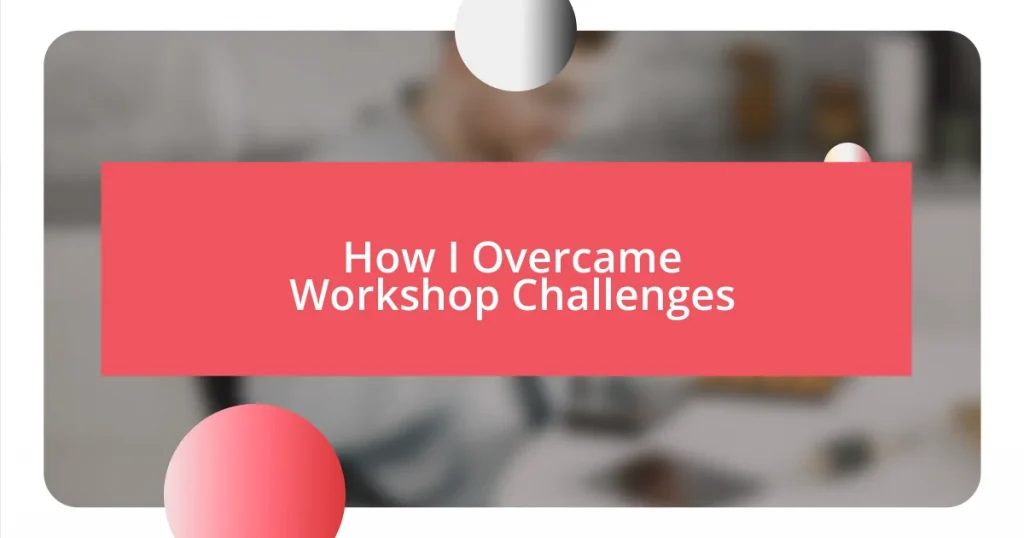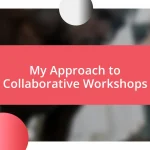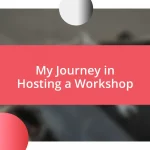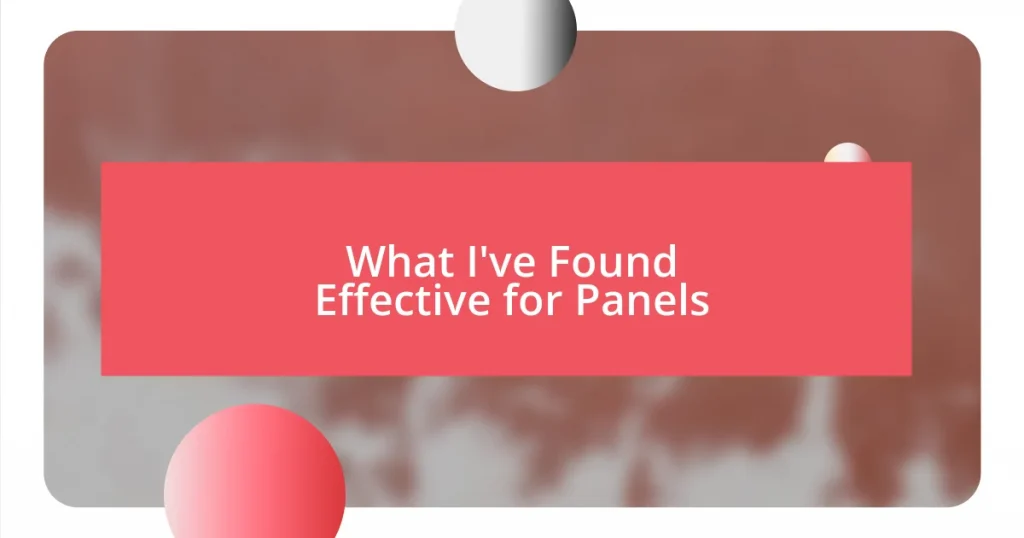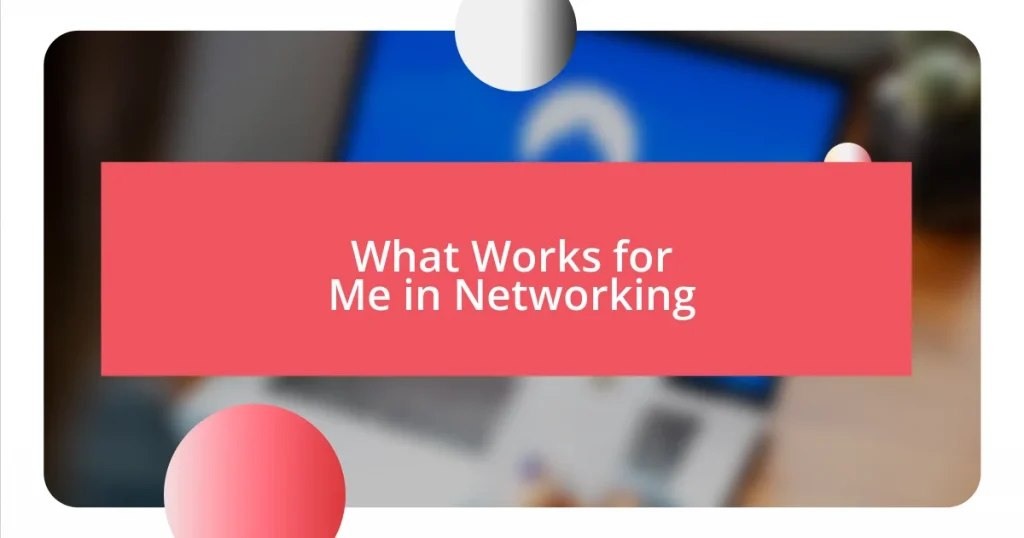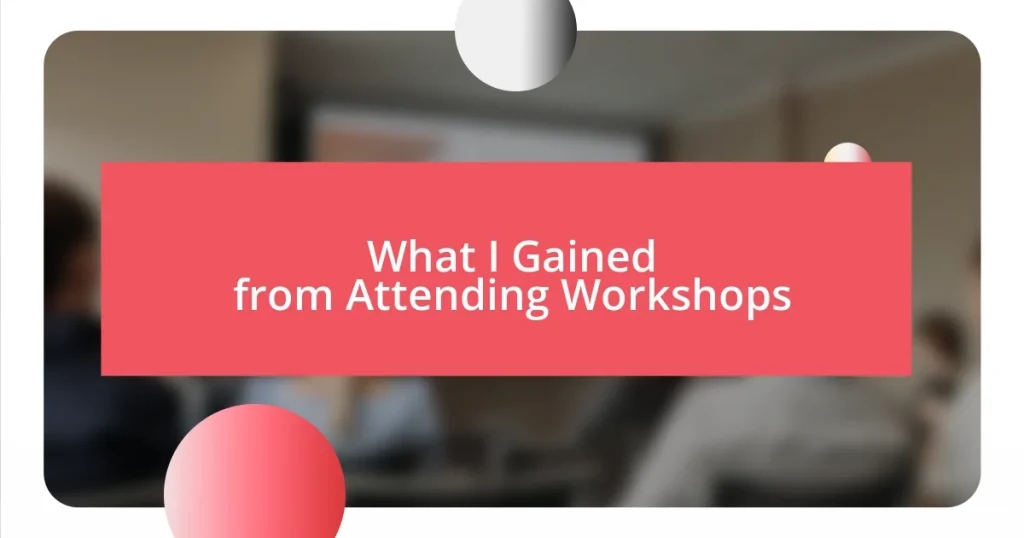Key takeaways:
- Identifying and preparing for workshop challenges, such as technical issues and participant dynamics, is crucial for a successful facilitation experience.
- Developing problem-solving skills and utilizing feedback loops enhances engagement and collaborative learning among participants.
- Celebrating both successes and learning moments fosters a supportive community and motivates continuous growth within workshop settings.
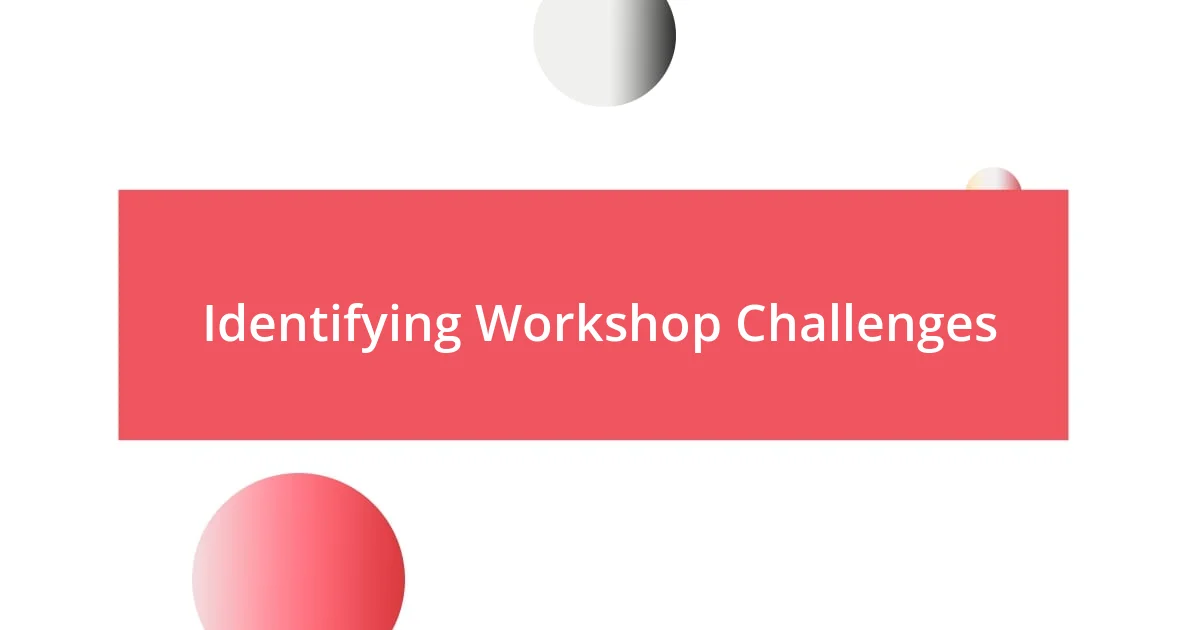
Identifying Workshop Challenges
Identifying workshop challenges is often the first step toward a successful experience. I remember my early days as a facilitator when I faced unexpected technical difficulties. What I initially saw as a simple hiccup turned into a moment of self-reflection: how could I better prepare for the unexpected?
Another significant challenge I encountered was the diverse skill level of participants. Imagine leading a workshop where some attendees grasp concepts quickly while others feel lost. It made me realize that assessing everyone’s baseline knowledge at the start could create a more inclusive environment, encouraging everyone to engage fully.
One of my most memorable workshop struggles was managing group dynamics. I’ll never forget a session where two participants clashed over ideas, steering the entire workshop off course. It was a wake-up call for me; how could I foster a respectful dialogue among differing opinions and ensure every voice felt heard? Understanding these challenges not only helped me grow but also shaped my approach to facilitating workshops moving forward.
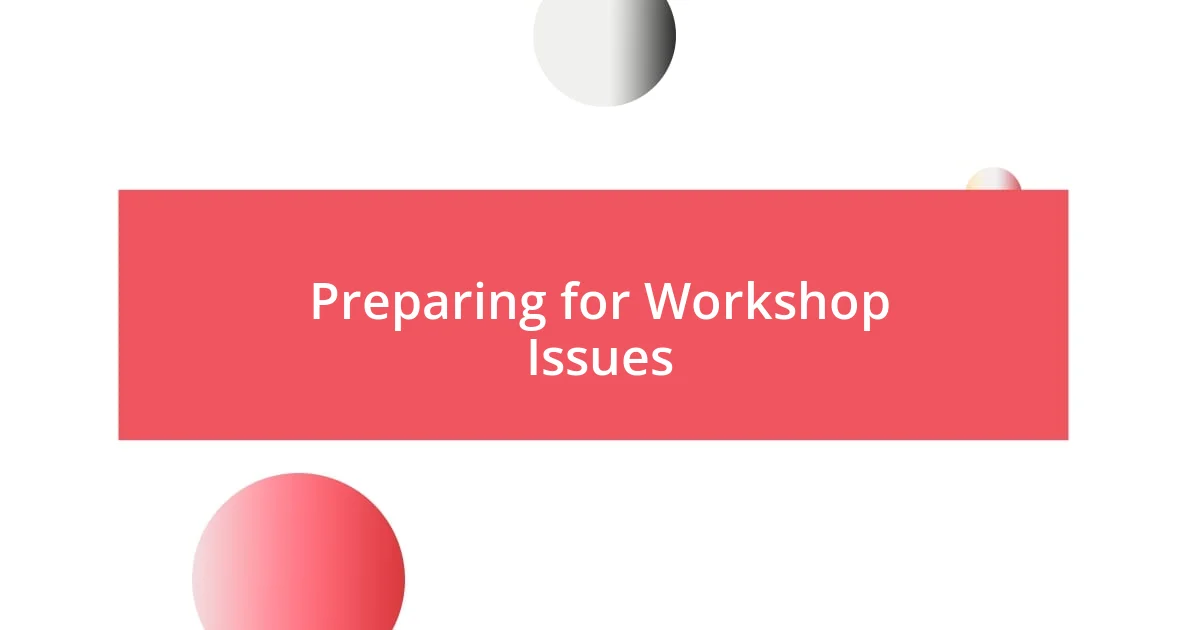
Preparing for Workshop Issues
Preparing for a workshop involves more than just organizing materials; it’s about anticipating potential issues that could arise. I’ve learned the hard way that neglecting to consider these factors can lead to unnecessary stress. For instance, during one of my early workshops, I had to address a fire alarm that interrupted our session. I found that thinking through emergency protocols in advance not only reassured me but also provided a layer of comfort for participants.
To prepare for workshop issues, I recommend considering the following:
- Technical Setup: Test all equipment beforehand, including projectors and microphones.
- Participant Engagement: Initiate icebreakers to gauge audience comfort and interaction levels.
- Resource Availability: Ensure backup materials are on hand—like hard copies of slides or worksheets.
- Environment Control: Think about the room’s layout and comfort, ensuring visibility and accessibility for everyone.
- Contingency Plans: Draft a plan for unexpected scenarios, from tech failures to disagreements among participants.
With these proactive steps, I’ve managed to foster an atmosphere that feels safe and inclusive, allowing for genuine learning and exploration.
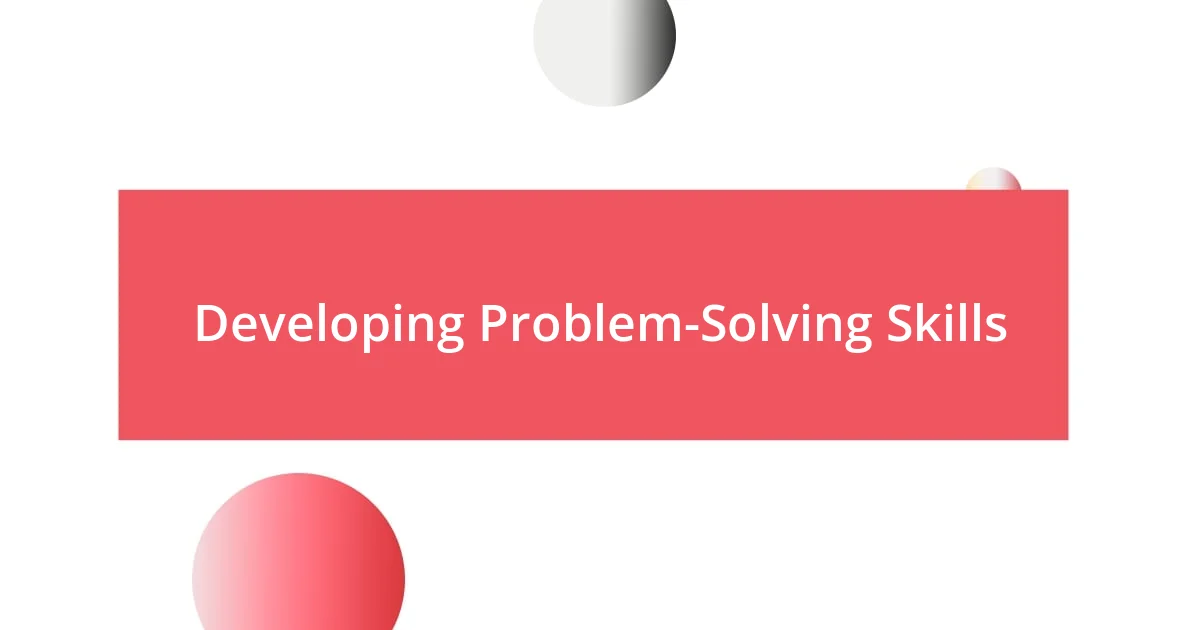
Developing Problem-Solving Skills
Developing problem-solving skills is essential when you face unforeseen challenges in workshops. I recall one particular incident when a discussion took an unexpected turn. Participants lost focus, and I found myself needing to quickly redirect the conversation. In moments like these, I’ve learned to ask open-ended questions to pull everyone back into the discussion. This not only engages the group but also helps in collaboratively finding solutions.
I’ve noticed that fostering a culture of collaboration among participants can significantly enhance problem-solving abilities. When a challenge arises, I encourage attendees to brainstorm together, drawing on their diverse perspectives. Once, during a brainstorming session, I witnessed how different viewpoints sparked innovative ideas, shifting what could have been a frustrating moment into a vibrant exchange of possibilities. This collaborative energy truly transforms problem-solving from a burdensome task into a shared experience.
Additionally, reflecting on past challenges plays a vital role in developing problem-solving skills. After each workshop, I set aside time to evaluate what went well and what didn’t. I remember feeling a mix of pride and learning when I acknowledged my reactions to difficult situations. It was empowering to see how I grew from these experiences, understanding that each challenge is an opportunity to refine my skills and approach.
| Problem-Solving Approach | Example from Personal Experience |
|---|---|
| Open-Ended Questions | Redirecting a distracting conversation by asking, “What other ideas do we have on this topic?” |
| Group Collaboration | Encouraging participants to brainstorm together during a tension-filled session led to unexpected solutions. |
| Reflective Practice | Evaluating my responses post-workshop helped me realize growth opportunities. |
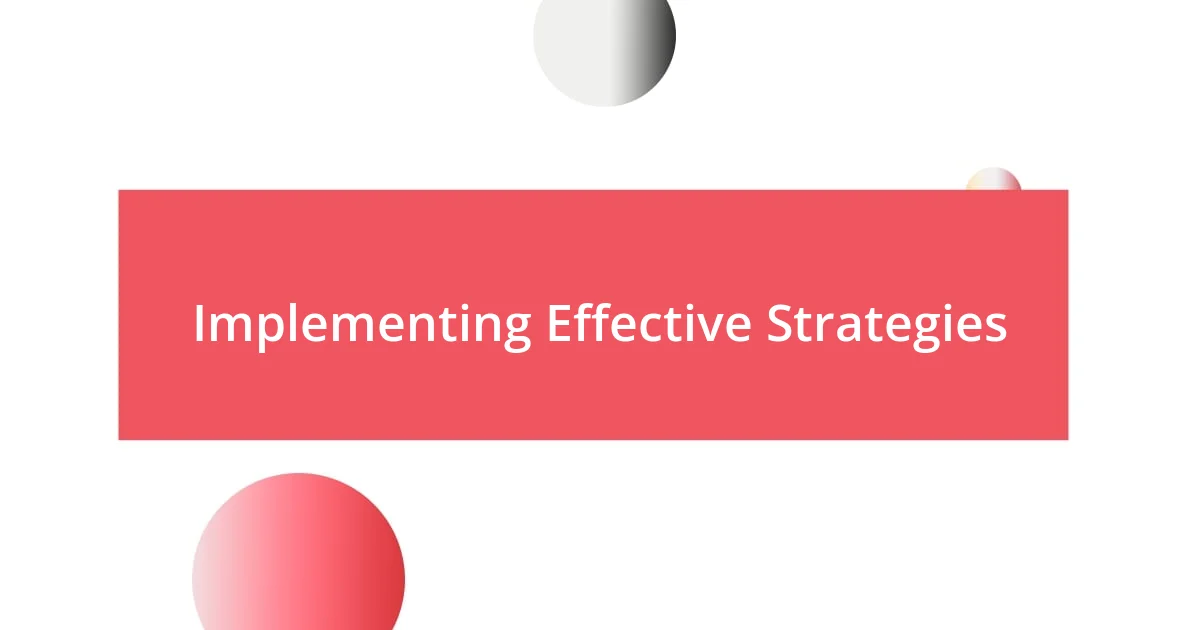
Implementing Effective Strategies
Implementing effective strategies requires a blend of adaptability and foresight. For instance, I once implemented a “pause and reflect” strategy during a particularly chaotic workshop. When participants seemed overwhelmed by new concepts, I encouraged a short break for everyone to jot down their thoughts. It was astonishing to see how that small pause allowed them to process the information and come back with fresh insights, transforming the energy of the room.
Another approach that has proven invaluable is the use of feedback loops throughout the workshop. I remember vividly a session where I took a few moments after each major segment to check in with participants—”What are you thinking so far? Anything we should dive deeper into?” This simple practice not only made participants feel heard but also provided me with real-time adjustments, enhancing the overall experience. Who knew that a little added interaction could pave the way for richer discussions?
Lastly, I’ve found that visualization techniques can genuinely enhance comprehension. During one workshop, I guided attendees through a visual mapping exercise to visualize interconnections between concepts. The transformation was magical—watching participants’ faces light up as they began to see the bigger picture. It’s moments like these that remind me how the right strategy can bridge gaps in understanding and foster an animated learning environment. What strategies have you found effective? I’d love to hear about your experiences!
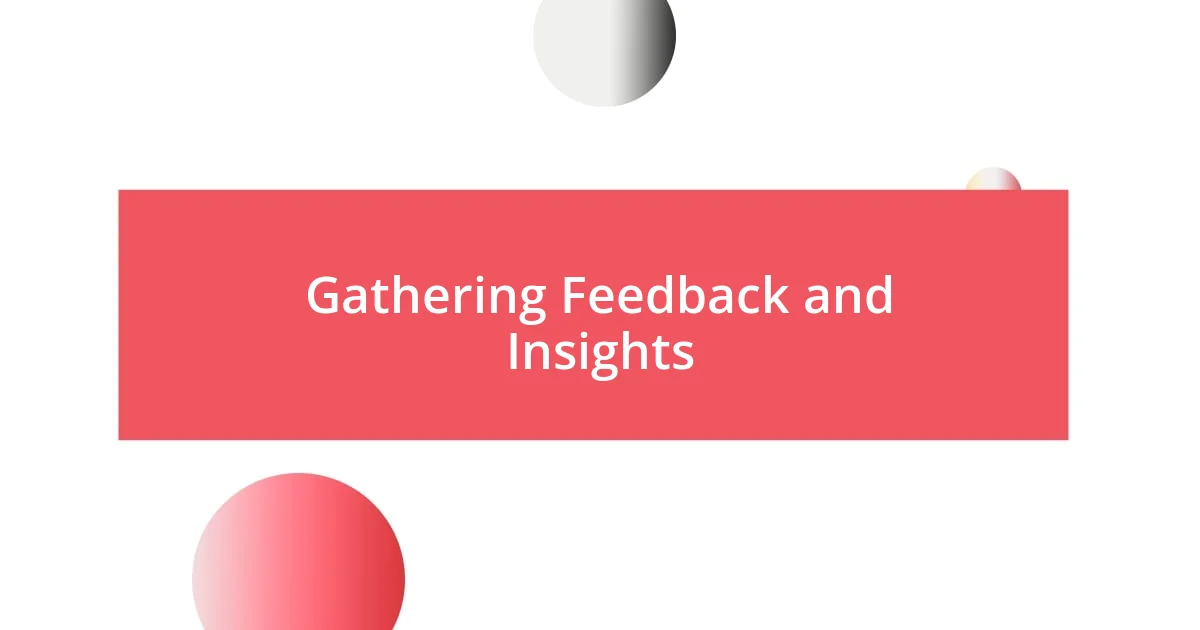
Gathering Feedback and Insights
Gathering feedback and insights can be a game-changer in the workshop environment. I vividly recall a workshop where I actively sought feedback through a quick anonymous poll midway through the session. The responses were enlightening—I learned that some participants were struggling with specific concepts, while others craved deeper dives into particular topics. This real-time input helped me pivot the session to better meet the needs of the group. Isn’t it fascinating how just a few minutes of gathering thoughts can drastically reshape the experience?
I’ve also found that informal discussions can uncover hidden gems of feedback. After one workshop, I casually asked a few participants over coffee what they enjoyed most and what could be improved. Their candid comments revealed a few blind spots I had missed—like the pacing of the content or an activity that didn’t resonate. It was humbling but incredibly valuable. Have you ever had a moment when informal chats led to profound insights?
Another technique I regularly employ is a feedback wrap-up at the end of each session. I ask participants to share one takeaway and one suggestion for improvement. This structured reflection not only empowers them to voice their opinions but also gives me concrete ideas for future workshops. I still remember a participant who expressed that a particular exercise clicked for them, and that’s something I’ve carried forward into my planning. Gathering feedback isn’t just about improving—it’s about creating a shared learning journey, don’t you think?
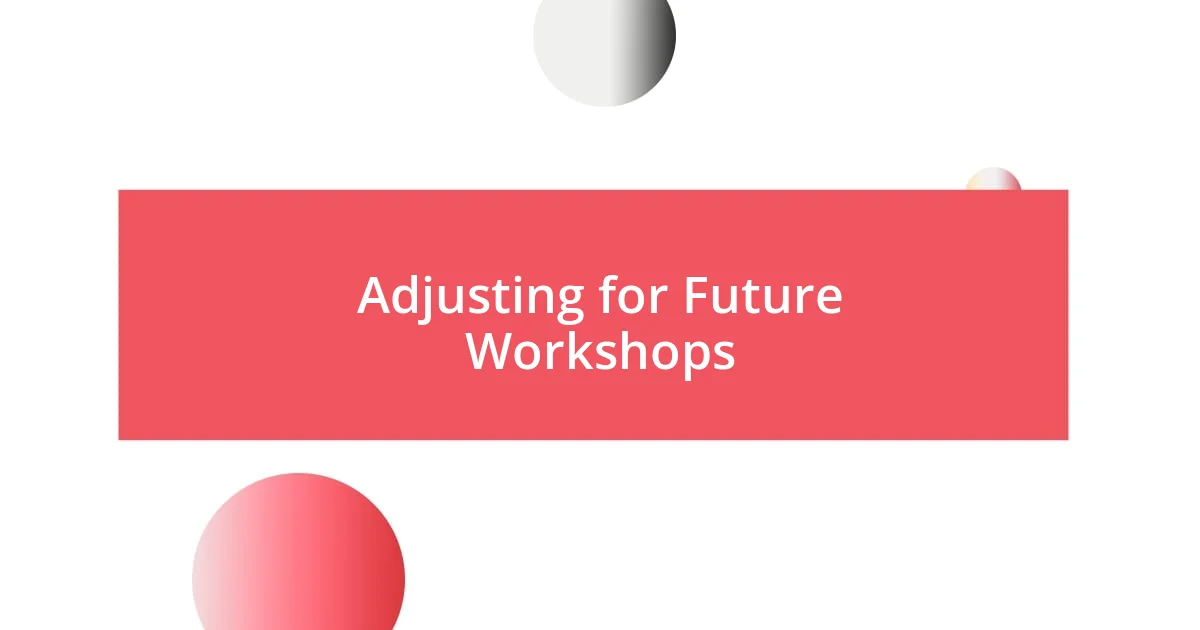
Adjusting for Future Workshops
Adjusting for future workshops involves reflecting on what worked and what didn’t. After one particularly hectic session, I realized the importance of pacing and the impact it had on participants’ engagement. Instead of barreling through the material, I’ve started to incorporate more breathing room in my agenda. It’s fascinating how a simple adjustment can make everyone feel more comfortable and open to learning.
I also learned that technology can either be a facilitator or a distraction. During a workshop where I used too many slides, I noticed the energy in the room dipping. People were focused on the screen, not on me or the discussion. Since that experience, I’ve minimized my use of slides, favoring more interactive activities instead. Have you ever caught yourself wondering if your presentation style was hindering connection? It’s a powerful reminder that sometimes less is indeed more.
Moreover, I’ve come to appreciate the value of follow-up communication after workshops. Recently, I sent out a brief survey to participants to gauge the long-term impact of our discussions. The responses were incredibly touching; they expressed gratitude for the support and insights gained. This practice not only validates the effort put into the workshop but allows me to adjust future content based on their ongoing learning journeys. How about you—do you maintain communication with your participants after the event? It’s such a rewarding experience to see how your work continues to resonate with them!
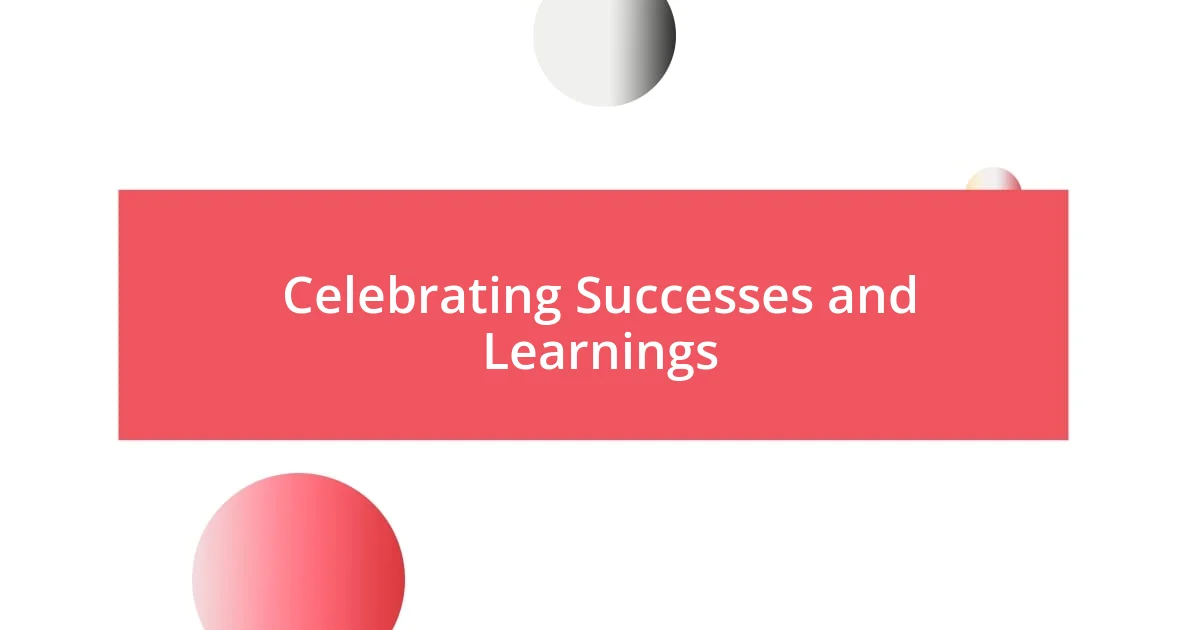
Celebrating Successes and Learnings
Celebrating successes, no matter how small, is crucial for motivation and growth. I recall a workshop where we reached a significant milestone—participants completed a challenging group project successfully. The sense of accomplishment that filled the room was palpable, and I joined them in celebrating that moment. Reflecting on that experience, I realized how essential it is to acknowledge both individual and collective efforts. Have you ever felt that rush of pride when a team hits a goal together?
Throughout my journey, I’ve learned to embrace not just successes but also the learning that comes from challenges. After a particularly tricky session where the anticipated outcomes didn’t materialize as planned, I gathered everyone to share their thoughts. Instead of focusing on what went wrong, we turned the conversation into a learning opportunity, highlighting the insights gained and the unexpected paths we explored. It was enlightening to see how setbacks can often lead to richer discussions and greater understanding. Doesn’t it feel good to transform challenges into lessons?
In my experience, creating a culture of celebration within workshops fosters a sense of community among participants. I’ve started ending sessions by inviting each person to share one success they experienced during our time together. This practice has become a highlight for many, as they not only receive recognition but also witness the diverse triumphs of their peers. I think it’s remarkable how these moments of sharing build camaraderie and inspire everyone to keep pushing forward. Have you considered how celebrating each other’s achievements can elevate the entire group experience?




